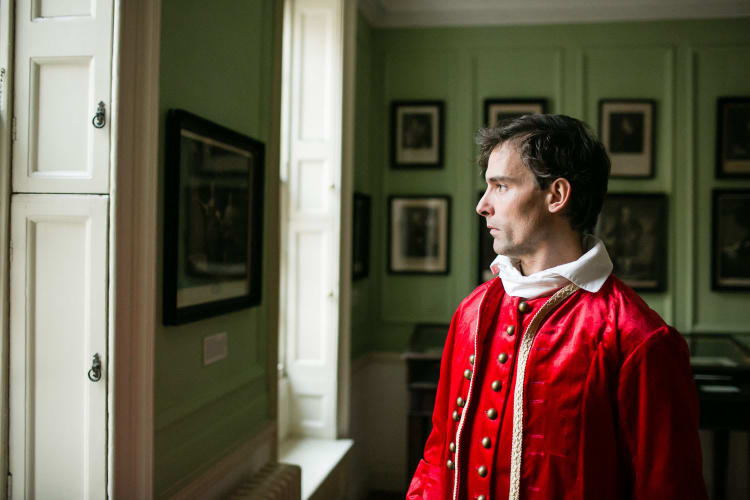Today’s world of celebrity culture isn’t a new thing. There have been people who have attracted the same kind of attention long before modern media existed. Star is set 270 years ago when the A-List would certainly have included actor David Garrick who had just taken over the management of the Theatre Royal Drury Lane.
Garrick had been a friend of writer and lexicographer Samuel Johnson since being his pupil in their hometown of Lichfield. They came to London together when Garrick came to join the London end of the family wine business. The play was commissioned by Doctor Johnson’s House to mark the tercentenary of Garrick’s birth and to accompany their current exhibition exploring the life of the actor and his friendship with Johnson.
It is played in the intimate setting of an upper room in the house in which Samuel Johnson lived but is set in the Drury Lane theatre where Garrick is about to open his first season as sole manager, a season for which Johnson wrote a special prologue.
With only a few hours to go before the first night, Garrick is far from relaxed as he talks to his friends the painter and the theatre’s scene painter Francis Hayman while posing as he sketches him as Ranger in The Suspicious Husband.
Star is in the form of a monologue; we don’t hear what his friend says, but we get a very positive picture of a man whose excitement is matched by his ego: he seems pretty big-headed, or is this just a man boosting his own confidence. He’s certainly got reason to worry. Taking over the management has left him with a debt of £8,000 and he has a work force of 175 for whom he has to find wages.
He talks of his own determination to get rich but also to serve the theatre by making his profession socially acceptable and improving the quality of performance, for theatre had been going through a low patch artistically and actors were considered disreputable. Aspirations are mingled with gossip, about an attractive young dancer from Austria (she became his wife a couple of years later), the performances of some of his actresses: Kitty Clive and Peg Woffington.
He harks back to his own first theatrical ventures: a school production of The Recruiting Officer that he put on in the Bishop’s Palace in Lichfield, to Johnson’s first play Irene, written 14 years ago and still awaiting performance (it turned out to be his only play), to his apprenticeship stint with vintners in Portugal, but he is mainly concerned with his plans for reforming the theatre.
There is going to be no more letting fashionable gentlemen sit on the stage or visit actresses in their dressing rooms. Unlike many, Garrick prized respectability highly, determined to lift the stigma attached to performers by the availability of such contacts.
He says he’s going to reform the box office. There will be no more refunds to people who leave after the first scenes, no half-prices for those who only turn up for the last ones.
He will end actors’ ranting and bombast and make acting more real, improve production values and mount productions of Shakespeare. He did indeed gain a reputation for restoring Shakespeare to the original but we hear him speak of Shakespeare’s flaws. He’s not keen on ghosts or the witches in Macbeth, a play women in particular don’t like (and they make up a large part of the audience), but it does have parts that actors relish playing. In restoring King Lear, he won’t go as far as letting Cordelia die.
If you are not already well versed in theatrical history, this is an hour-long performance packed with information that Nick Barber’s lively performance prevents from turning into a lecture, its detail introduced with great naturalism. If it isn't all new to you it is still a intriguing insight catching a particular moment.
If Hayman remains pretty quiet, perhaps it is because he is too busy drawing but, if he did contribute more, in this mood Garrick would probably just talk over him. There is a glimpse of a man whose friends need to be tolerant but you also see the personality that could win his own place in society.
There is little action but much agitation with show time so near. It is still not decided whether he or Peg Woffington will deliver the epilogue he has written and he has to remember Johnson’s prologue. It is the one that includes the well-known lines:
The drama’s laws the drama’s patrons give,
For we that live to please, must please to live.
Before dashing off, he tries out a little of it but Star doesn't attempt to display Garrick's acting this is a glimpse of the man offstage. As he poses for the picture it offers a portrait of the man and his life up to this point presented with dramatic flair.
Star plays only on Sundays. The exhibition Johnson & Garrick: A Friendship in Constant Repair continues until 3 February 2018.
